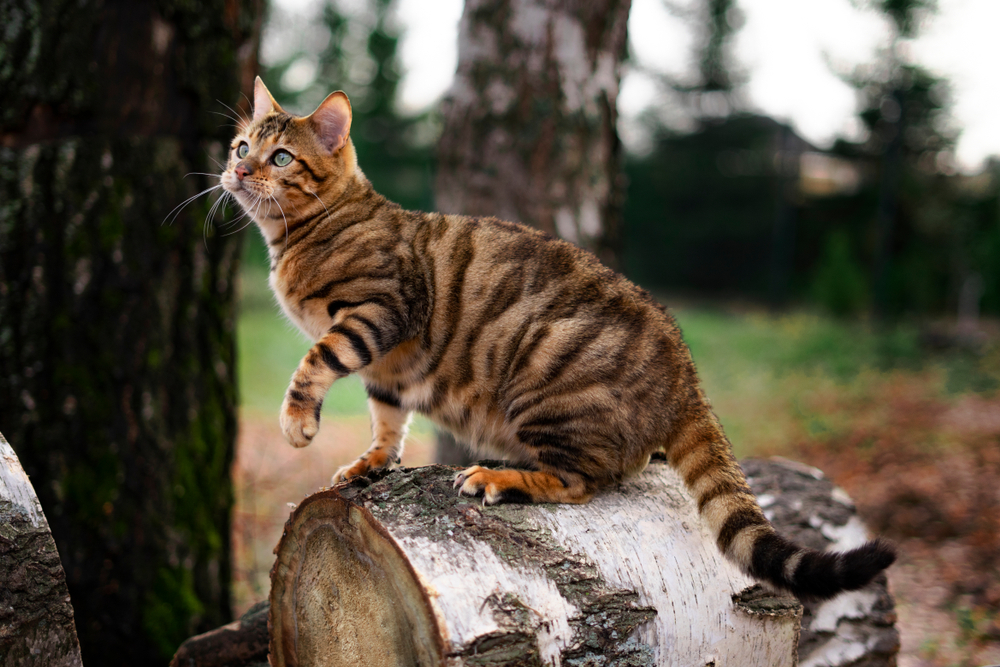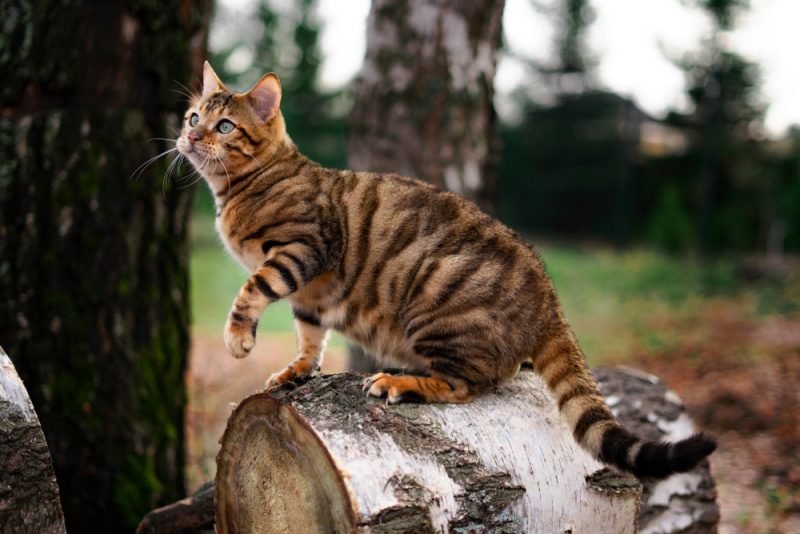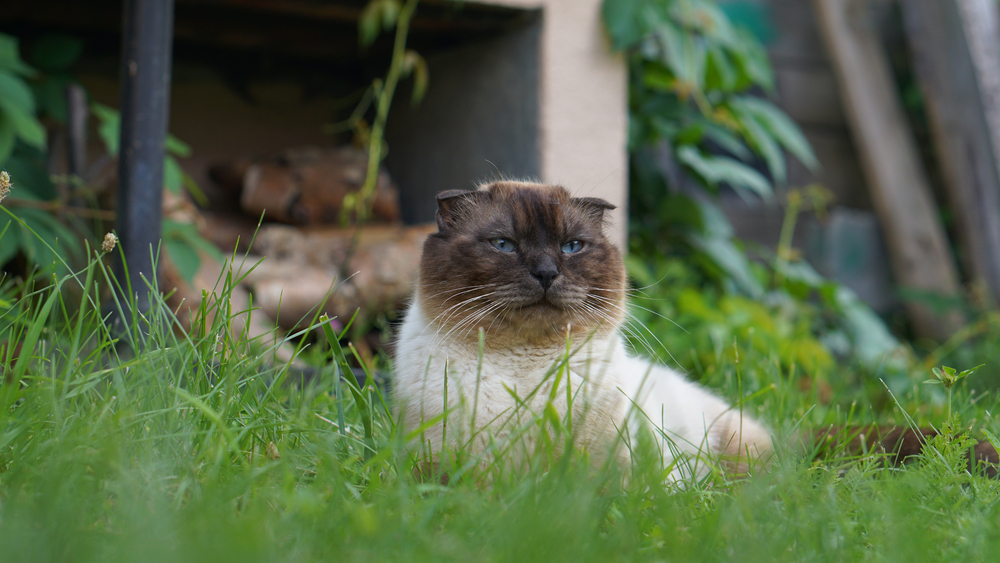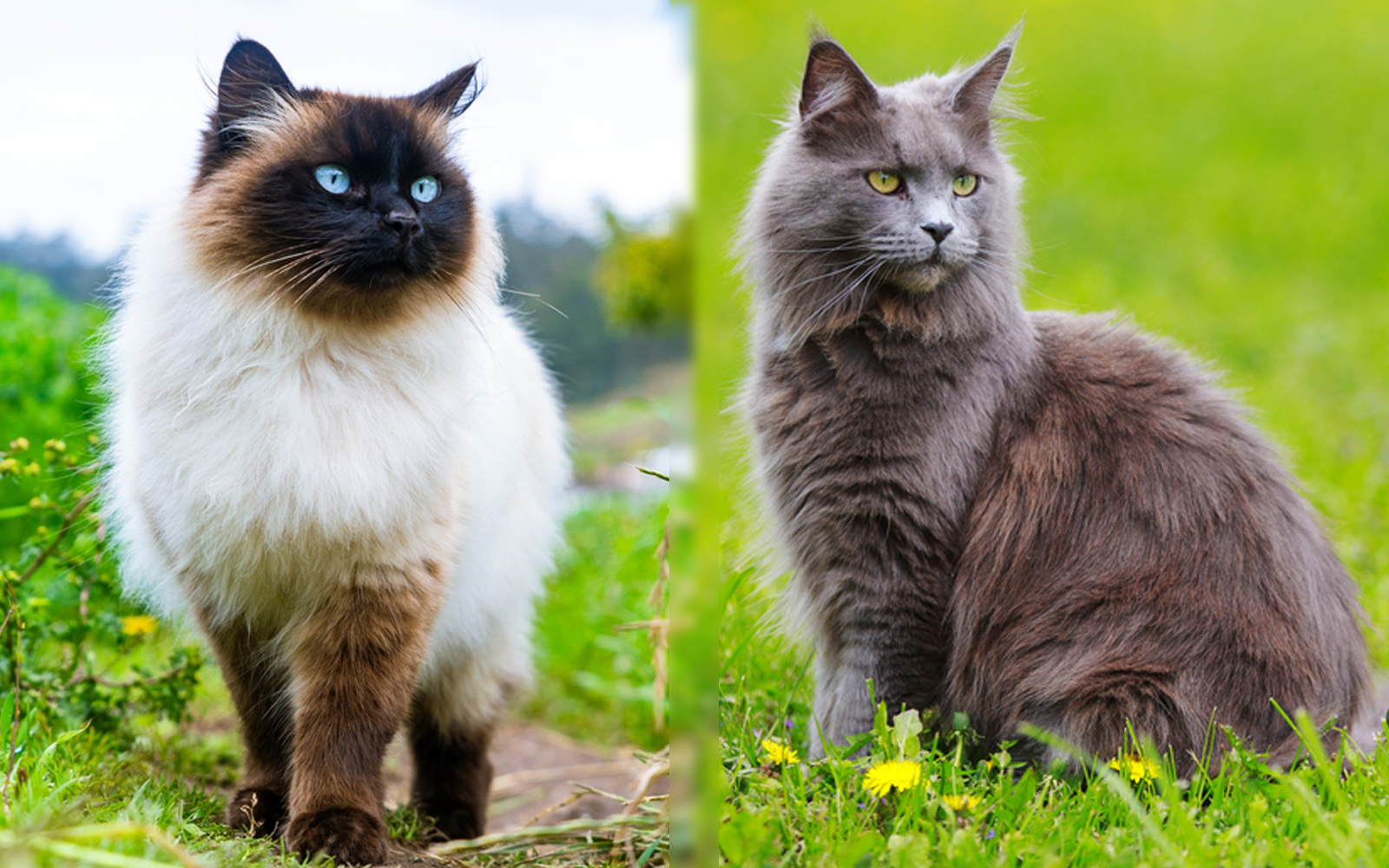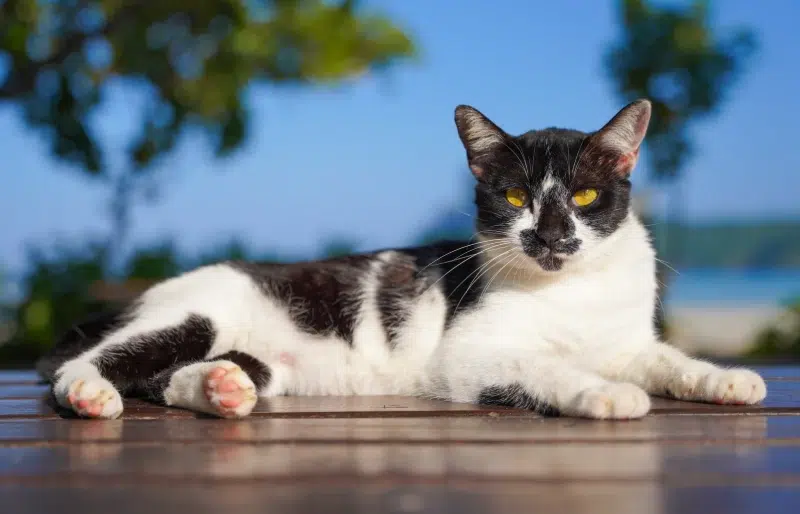Click to Skip Ahead
The Toyger is a hybrid breed, a combination of domestic shorthair tabby cats and a Bengal cat. If you’ve ever dreamed of having your own tiger around the home, the Toyger comes pretty close! While there are no wildcat genetics in this breed, it certainly looks like it, and they have distinctive tiger stripes decorating their body. In fact, the origins of the Toyger were specifically aimed toward bringing light to the plight of the endangered wild tiger by bringing its majestic beauty closer to home.
Height: 14–18 inches Weight: 7–15 pounds Lifespan: 12–15 years Colors: Brown, orange, and black mackerel tabby Suitable for: Families, singles, couples Temperament: Outgoing, friendly, calm, energetic, intelligent, playful While these cats look wild, they are domestic cats through and through and are as sweet, calm, and loving as they come. They are smart and affectionate animals that make a great addition to any family home. If this wild-looking cat has caught your attention, read on below for an in-depth look at this fascinating feline!
Toygers are strikingly beautiful cats that, despite their wild appearance, are loving, gentle, and affectionate animals by nature. This means they will very likely fit in with any other cats in the home peacefully and happily. Be sure to have food, treats, bowls, and toys at the ready before bringing your Toyger kitten home, and of course, a comfy bed! Toygers are rapidly becoming an exceedingly popular breed, and depending on availability and breeders, they can fetch high prices for their kittens. There are only a handful of registered breeders of Toygers worldwide and so one of these kittens can be difficult to find. Toygers are so docile and loving and have such a beautifully unique appearance that breeders have trouble keeping up with the demand for these kittens, and for this reason, kittens can reach prices of up to thousands of dollars. The Toyger was designed and developed by the original breeder, Judy Sugden, to look like just like a miniature tiger. Her hope was that by creating a domestic cat so similar to a wild tiger, it would bring more awareness to the general public about the majesty and beauty of tigers, and this would inspire more concerted efforts toward their conservation. Judy Sugden is the daughter of Jean Mill — the original breeder or the Bengal cat. Sugden noticed that one of her tabbies had two circular spots on its forehead, similar to a tiger, rather than the traditional “M” marking of tabbies. She began her breeding program with this tabby and a large Bengal, and later introduced an additional tabby that had spots between its ears rather than traditional tabby lines, and the Toyger was born! The Toyger is surprisingly yet to be registered with the Cat Fanciers’ Association (CFA), despite the fact that the breed has been around since the 1980s and is rapidly growing in popularity. The International Cat Association, however, began registering the cats as early as 1993, and the breed was granted full championship status in 2007. TICA is currently the only cat association that recognizes the breed. The Toyger is an intelligent, affectionate, playful, and curious cat, and despite their wild and striking appearance, they are about as loving as they come. They are social animals that love to be close to their owners and adore a cuddle on the sofa. In fact, these cats become very attached to their owners and do not enjoy being left alone at home for long periods, a fact they’ll quickly show you with potentially destructive behavior! If you are away from home for extended periods, it’s a great idea to get two kittens or have another equally friendly cat to keep them company, otherwise, this is not the breed for you. They are active cats that love to play and interact with their owners, but not so much that they’ll tire you out or need your constant attention. Indeed, while these cats love human company, they are not overly needy or clingy; they just like to have you close by. Toygers are great family pets and get along well with children, provided the children have been taught to respectfully handle them. They are always up for affection and a cuddle and will make fast friends with kids. That said, they prefer quiet homes with not too much manic activity, and children should always be taught to respect this trait. Toygers are friendly, adaptable, and calm animals that generally get along great with other cats. They are fine with dogs, so long as dogs are fine with them! If your dog is not socialized toward cats and sees them as an object to chase, your Toyger will react in a defensive manner. However, if your dog is happy to share their home with a feline, the Toyger is unlikely to cause any issues. They have a moderate prey drive, around the same as any other domestic cat, which can be an issue if you have any pet rodents! Toygers do not have any special dietary requirements that differ much from any other domestic shorthair. They do well on high-quality dry kibble, but we recommend supplementing this with wet food and lean meats whenever possible. It’s also good practice to divide their meals into two, and you can use the morning meal for kibble and the evening meal for wet food or lean meats. It’s important to remember that cats are obligate carnivores and as such need a diet that is high in good-quality animal protein. A lot of commercial cat foods contain protein from plant sources, and this is not ideal for cats as it can be difficult to digest and cause stomach issues. Be sure that the food you give them has an animal-based source of protein as the first listed ingredient. In general, cats need around 50% of their caloric intake to be from protein and at least 30% from fat. Toygers are not overly active cats and so can be fairly susceptible to getting overweight. This is why we advise against free-feeding them or giving them too many treats or table scraps. As with any cat, make sure they have fresh, clean water available at all times. While Toygers love to play and interact with their owners and other animals, they are not overly energetic animals and don’t require huge amounts of exercise. Apart from their everyday movement and play, they do not need much additional exercise from their owner. Of course, they’ll love interactive games with their owners, and due to their high intellect are known to easily be trained to fetch objects and swiftly solve puzzle games. Toygers are intelligent cats that are known to be highly trainable. They are swiftly house-trained and can even be trained to walk on a leash! These cats love to interact with their owners and are eager to please, making training something they are likely to adore. Be sure to keep training sessions short and entertaining and avoid using any harsh training methods. These cats are sensitive and do best with positive reinforcement training methods. Toygers have short, coarse coats that are a breeze to keep maintained. Even daily petting and stroking is usually enough to keep their coat brushed, but weekly brushing will help remove any dead hair and prevent it from ending up all over your home! As with any cat breed, make sure to keep their ears clean and brush their teeth to avoid dental problems. They may need occasional nail trimming, but if you give them a scratching post, this shouldn’t be an issue. Toygers are known to be a healthy and robust breed that suffer from very few genetic health problems. They are a fairly new breed and so there is not much data to make any conclusive determinations about their health. That said, there are several issues that have been seen within the breed, including heart murmurs, which may be an indication of hypertrophic cardiomyopathy, and progressive retinal atrophy. There are very few differences between male and female Toygers, although males are known to be larger and heavier than females. Unless you intend on breeding, we highly recommend neutering males and spaying females, as this will prevent wandering in males and unwanted pregnancies in females. There is very little difference in temperament between males and females, especially when they’ve been fixed. Un-neutered males can display territorial and aggressive behavior at times and will, of course, tend to mark their territory — an incredibly frustrating trait. Remember that your Toyger’s personality is far more affected by their upbringing and environment than their sex, and every cat — male or female — is a unique individual that will have their own quirks and unique traits. The Toyger is a beautiful cat, with wild-looking markings that make it feel as if you’ve got a miniature tiger in your midst! But it’s not only their striking appearance that makes them such a desirable cat; they are as loyal, loving, and affectionate as any other domestic breed, and make a fantastic addition to any family. They are also a healthy breed with very few known genetic health issues and are a breeze to groom, making them an easy to care for, low maintenance pet. Their high intellect makes them easy to train, and while they enjoy their owner’s company and do not enjoy being left alone for long periods, they’re not overly clingy or needy cats and are happy as long as you are close by. These cats are difficult to find and pretty expensive, but if you’re lucky enough to find one, they make a wonderful, eye-catching pet indeed! Featured Image Credit: Kutikova Ekaterina, ShutterstockBreed Overview
Toyger Characteristics
Toyger Kittens
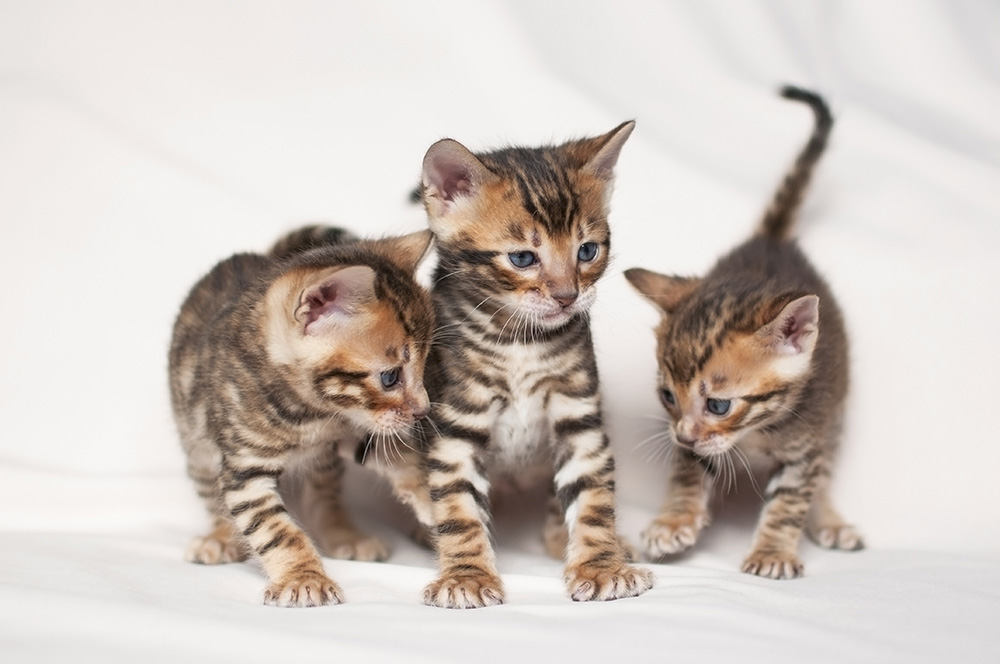
3 Little-Known Facts About the Toyger
1. Toygers were created with tigers in mind.
2. They were developed from several different breeds.
3. They are not officially recognized by the CFA.
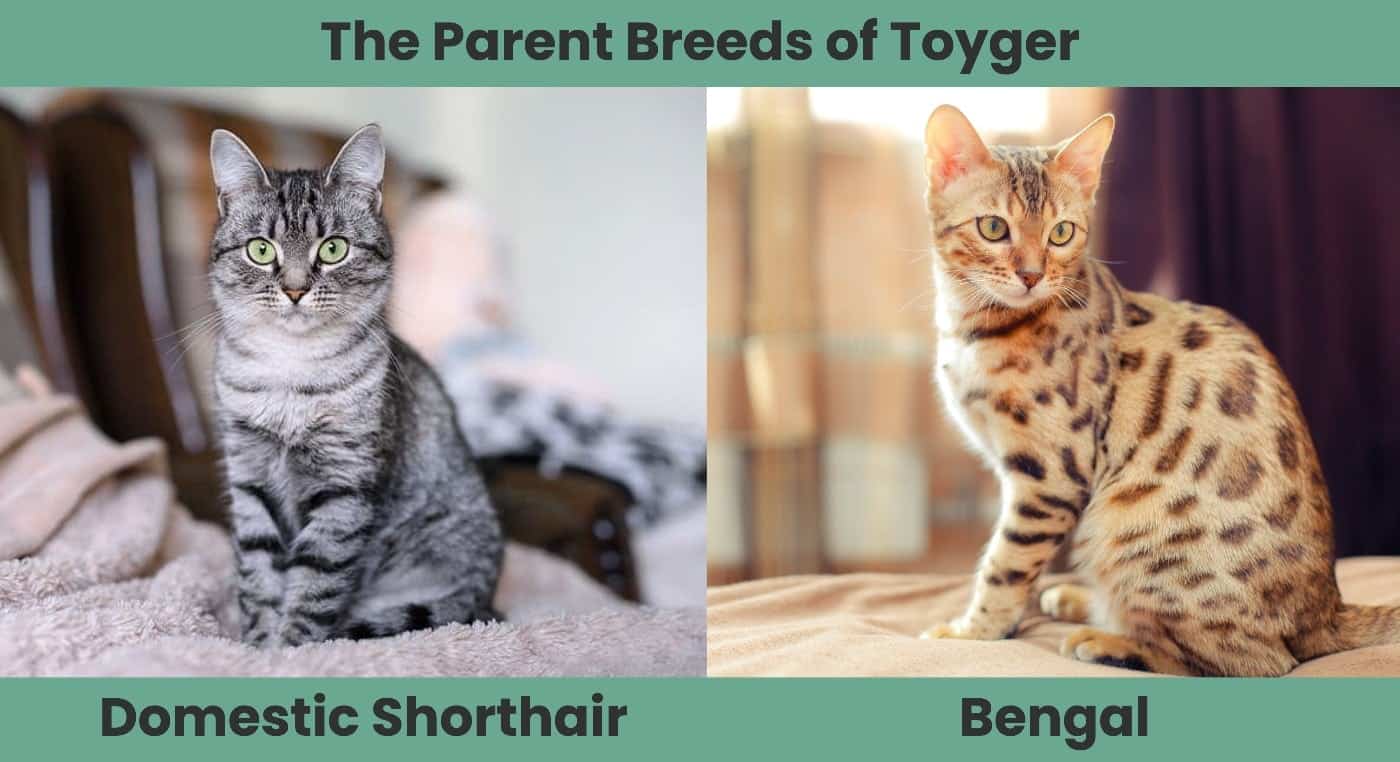
Temperament & Intelligence of the Toyger
Are These Cats Good for Families?
Does This Breed Get Along with Other Pets?
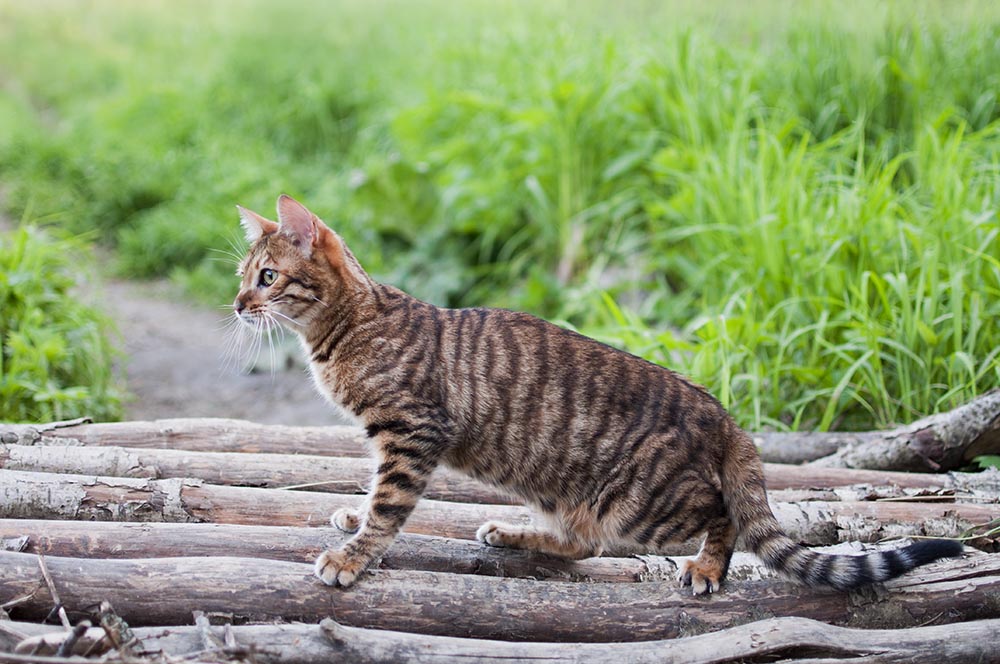
Things to Know When Owning a Toyger:
Food & Diet Requirements
Exercise
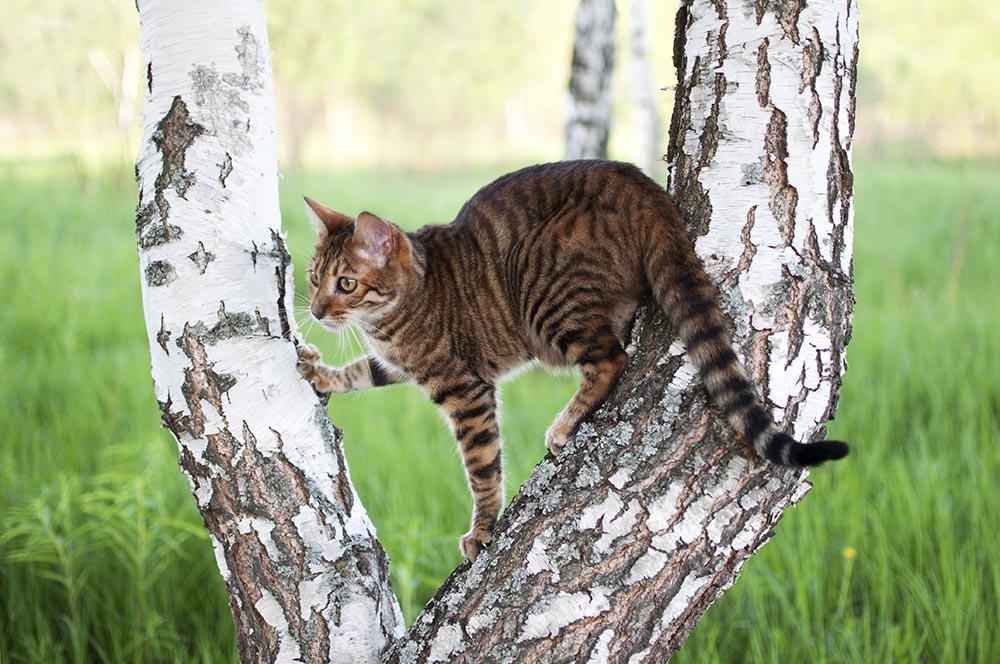
Training
Grooming ✂️
Health and Conditions
Male vs Female
Final Thoughts

